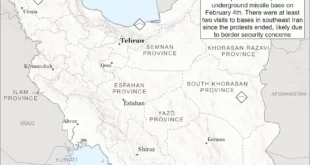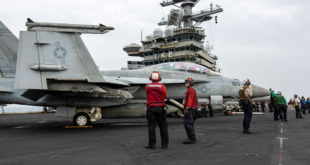 TEHRAN (FNA)- Iranian officials said all Iraqi ethnic and political groups should stand in unity in negotiations with Washington over the long-term security arrangement.
TEHRAN (FNA)- Iranian officials said all Iraqi ethnic and political groups should stand in unity in negotiations with Washington over the long-term security arrangement.
Iranian President Mahmoud Ahmadinejad said in a meeting in Tehran on Thursday with Kurdish President Massoud Barzani that the American presence in Iraq only serves to undermine unity and create friction in the region.
He said the draft US-Iraq security accord is aimed at keeping Iraq weak to help America “pillage” the country.
“The Americans have shown that they do not respect any agreement and, if their interests require it, they are ready to sacrifice their closest friends,” the president said.
“They do not distinguish among Shiites, Sunnis and Kurds. They want to prevent the creation of a strong and powerful Iraq, the better to pillage the country,” Ahmadinejad said.
The US is in talks with Iraqi officials to get them to sign a provocative security agreement which secures long-term US presence in Iraq.
If ratified by the Iraqi government, the Status of Forces Agreements (SOFA) would also grant US forces in Iraq immunity from prosecution.
It also gives the occupation forces a free rein to stage military operations wherever and whenever they deem necessary, without consulting the Iraqi government.
Other Iranian leaders joined Ahmadinejad in denouncing the proposed pact on Thursday, including chairman of the Expediency Council and Experts Assembly Akbar Hashemi Rafsanjani, Parliament Speaker Ali Larijani and Interior Minister Ali Kordan.
Rafsanjani said the US negotiations in Iraq are centered on protecting Washington, not Iraqi interests.
“Occupiers should not endanger the Iraqi nation’s security in order to maintain their own security,” he said.
Larijani said, “The Americans’ aim was to make sure the Iraqi government is second rate. This is why Iraqi public figures do not defend the agreement and have expressed reservations.”
He criticized a clause in the deal which shields American military personnel from Iraqi justice if they commit crimes on their bases or while on a mission.
“It is a capitulation,” he said, comparing the pact with an agreement signed by the United States and the former Iranian imperial regime, which was ferociously denounced by the Shah’s opponents.
Kordan, speaking in Amman at a meeting of interior ministers of war-ravaged Iraq’s neighbors, said Tehran opposes any document that threatens Iraqi interests.
“Iran opposes any document that goes against the will of Iraqis and their leadership,” he said. “Iran opposes any document that would threaten Iraq’s interests.”
The proposed pact is also facing widespread opposition among Iraqi people, religious leaders and politicians.
Grand Ayatollah Kazem al-Hosseini al-Haeri, a senior Shiite religious figure, denounced the draft accord as “humiliating” for Iraq.
“We are aware of the pressures from the occupying forces on the Iraqi government to sign the humiliating security agreement… We know that this agreement will lead to loss of sovereignty and humiliation” for Iraqis, he said in a statement carried by the Islamic republic news agency.
“In earlier statements we already said this agreement is ‘haram’ (i.e. violating Islamic rules),” something banned by Islam, Haeri said.
Many fear Washington has plans to keep permanent bases, despite a denial of any such plan written into the proposal. Iraqis say the drafts submitted by the Americans thus far would infringe on Iraq’s sovereignty by giving US forces too much freedom to operate.
The security pact also faces strong criticism from members of al-Maliki’s own coalition. Two Iraqi officials familiar with the negotiations have warned that a deal is unlikely to be reached before the end of President Bush’s term in January unless Washington backs off some demands seen as giving American forces too much freedom to operate in Iraq and infringing on Iraqi sovereignty.
Iraq’s parliament must approve the deal, and the two officials said opposition in the legislature was so widespread that it stood no chance of winning approval without significant changes in the US position. The officials spoke on condition of anonymity because of the secrecy surrounding the negotiations.
The Baghdad government on Tuesday said it wants to modify the draft final agreement.
 Eurasia Press & News
Eurasia Press & News



